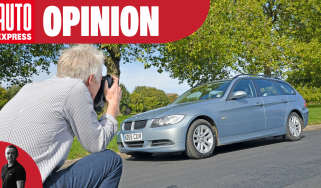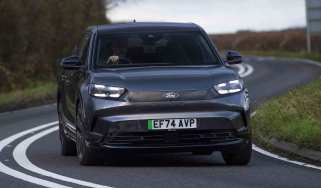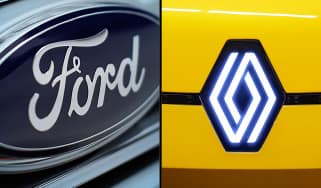Cost of leasing a car: What you really pay for PCH lease
What costs are involved in leasing a car? From initial rental to excess mileage fees, here’s everything you need to know

Car leasing in the UK typically costs between £200 and £1,000 per month, but the final price you pay can depend on several factors.
The monthly cost isn't just about the car itself. Your deal will also be affected by the length of the lease, the agreed annual mileage, and whether you want maintenance and insurance included. Some agreements require maintenance to be included, as proper servicing is crucial for the car's residual value at the end of the term.
Beyond your monthly payments, you'll also want to budget for potential end-of-term charges, so be prepared to cover unexpected fees for excess mileage or damage to the vehicle.
How is your monthly car lease payment calculated?

When you lease a car, the monthly payment is based on four key factors: the make, model, and specification of the vehicle you choose, your initial upfront payment, the length of the lease term, and your annual mileage allowance.
The leasing company uses these and other variables to set the cost. They factor-in the car's projected depreciation and reliability, especially if the lease includes a maintenance plan. Once your monthly payment is set, it's fixed for the entire lease term and won't change.
How do these factors impact the cost?
The car you choose is the single biggest factor in the cost of your lease. High-end brands like BMW and Mercedes-Benz will always be more expensive than budget-friendly options like Dacia or MG.
However, you can often adjust other factors to make a more expensive car fit your budget. For instance, if you want a Mercedes instead of a Ford, you can lower your monthly payments by making a larger initial upfront payment or by extending the lease term.
The mileage allowance also significantly impacts the overall cost. A higher annual mileage increases the risk of damage and lowers the car’s resale value at the end of the lease - which means you’ll pay more to cover 12,000 miles a year for example, compared with a 5,000-mile arrangement.
It’s crucial to choose a realistic mileage allowance that covers your needs, with a little extra room for unexpected trips. It’s always better to pay a bit more for a higher allowance upfront than to face hefty penalty fees for exceeding your mileage at the end of the lease.
Upfront Costs of a Car Lease
When you start a new car lease, you'll typically pay a few things upfront in addition to your first monthly payment.
Reservation Fee: Some leasing companies may charge a non-refundable reservation or administration fee. This fee covers the cost of finding, purchasing, and registering your vehicle. It can range from nothing to around £1,500, although is sometimes included in your total lease cost.
Initial Rental: This is the main down payment for your lease, similar to a deposit you'd pay for a car loan. It's often much lower than a down payment for a car you're buying because you're simply renting the vehicle and won't own it or build any equity.
Your initial rental is usually a multiple of your monthly lease payment - anywhere from one to 12 times the monthly cost. A larger initial rental will result in lower monthly payments throughout your lease.
Other costs of leasing a car
Once the initial payment and reservation have been paid, there are regular monthly outgoings you need to consider when leasing a car including your rental fee, insurance, maintenance costs and, indeed, fuel.
Monthly Rental
The monthly rental cost is easy to work with, as it will have been made clear at the very start of your lease agreement that this is the fixed amount you pay every month to the leasing company, for the life of the lease agreement. If all other conditions are met, then when you reach the end of the agreement you simply return the car and walk away.
Insurance
Some leasing companies include insurance within the overall cost, but the majority will require you to take out an independent policy. You will need to pay for this yourself and will be liable for any excess.
It's usually a condition of the lease, but the car has to have fully comprehensive insurance covering damage to the vehicle and also any third party liability. Your cover needs to start on the day you take delivery of the car and most lease companies will request to see a copy of the certificate before releasing the vehicle to you.
You must inform your insurance company that the car is a leased vehicle and not your own property.
Another thing to consider is GAP Insurance or Guaranteed Asset Protection. This will cover you if your leased car is damaged or stolen, as your insurance company may only pay out the car’s current value including depreciation, and not the total amount left on your leasing contract term.
Maintenance
As you will be leasing a new car, it will come with its full manufacturer’s warranty – and unless you're planning on leasing the car beyond this warranty period, it should protect you from any major expenditure related to mechanical failure.
However, a warranty does not cover everything. Wear and tear items such as brakes, tyres, clutches and even gearboxes aren't always covered by the manufacturers policy. Therefore, you should make an allowance from your household budget every month to pay for the general upkeep of your vehicle.
Many leasing providers do offer optional maintenance packages, which work in the same way as service plans to ensure that your car gets the regular servicing it requires, ensuring its warranty remains valid and its residual value is protected.
If you're planning on keeping the car for longer than three years, then after this time, you also need to factor in the cost of an annual MoT test, which is currently around £55 per year.
Fuel or electricity
While working out your lease car budget, do also look closely at the car’s fuel economy as this is likely to be one of the biggest chunks of your monthly motoring budget. Work out your mileage against the car’s quoted MPG figure to come up with a rough amount that you need to pay each month. Remember that official efficiency figures can be hard to achieve in the real world, depending on the type of driving you do.
If you're leasing an electric car – and particularly if you're driving an EV for the first time –also bear in mind that it’s far cheaper to charge your car at home than it is using a public charging network.
Costs at the end of a lease deal
If you’ve kept to the terms and conditions of a car lease then any costs at the end of it should be minimal unless you need to exit your car lease early.
Damage
The majority of leasing companies adhere to the British Vehicle Rental & Leasing Association (BVRLA) Fair Wear and Tear guidelines, which are there to protect customers just as much as they are the rental companies.
Within the guidelines, things like minor scuffs and scratches, light damage to alloy wheels, small chips to glass areas and acceptable wear to interior fabrics are all factored in and are unlikely to result in a penalty charge.
However, any significant damage to the car’s interior, exterior or heavy soiling (for example, a strong smell of cigarette smoke or burns to the interior fabric) are likely to result in repair or refurbishment charges. Similarly, a cracked windscreen or a heavily buckled alloy wheel may also land you with a fee.
Excess Mileage Charge
Quite a few lease drivers get caught out by excess mileage charges, as they often underestimate the mileage they think they will cover, believing it might work out cheaper in the long run. It rarely does.
Excess mileage will affect the car's resale value, which is factored into your monthly payments at the start of your lease. If you do exceed your annual mileage limit, then you pay for the excess on a per-mile basis.
If your circumstances change and you find yourself doing a higher mileage than when you started the lease – for example, if you change jobs – then it's a good idea to contact your leasing company straight away, as they may be prepared to amend your monthly rental charge to factor in the higher mileage you're now covering, helping avoid a nasty surprise at the end of your term.
Frequently Asked Questions
From a cost perspective, leasing a car has two major advantages. The first is that it’s nearly always cheaper than buying a car on hire purchase, or taking out a PCP, which is in many ways a halfway house between leasing and buying.
The initial payments are smaller and the monthly payments are normally less as well. You also don't need to worry about depreciation, as you are never the car's owner – if its value drops by more than the leasing company projects at the start of the contract, that's their problem and not yours.
Now you can buy a car through our network of top dealers around the UK. Search for the latest deals…











